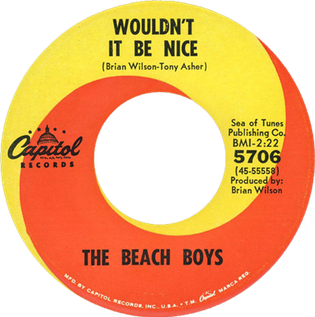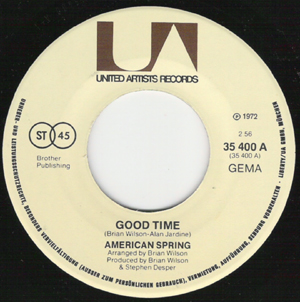
The Beach Boys are an American rock band formed in Hawthorne, California, in 1961. The group's original lineup consisted of brothers Brian, Dennis and Carl Wilson, their cousin Mike Love, and friend Al Jardine. Distinguished by its vocal harmonies, adolescent-oriented lyrics, and musical ingenuity, the band is one of the most influential acts of the rock era. The group drew on the music of older pop vocal groups, 1950s rock and roll, and black R&B to create its unique sound. Under Brian's direction, it often incorporated classical or jazz elements and unconventional recording techniques in innovative ways.

Brian Douglas Wilson is an American musician, singer, songwriter, and record producer who co-founded the Beach Boys. Often called a genius for his novel approaches to pop composition, extraordinary musical aptitude, and mastery of recording techniques, he is widely acknowledged as one of the most innovative and significant songwriters of the 20th century. His best-known work is distinguished for its high production values, complex harmonies and orchestrations, layered vocals, and introspective or ingenuous themes. Wilson is also known for his formerly high-ranged singing and for his lifelong struggles with mental illness.

Bruce Arthur Johnston is an American singer, musician, and songwriter who is a member of the Beach Boys. He also collaborated on many records with Terry Melcher and composed the 1975 Barry Manilow hit, "I Write the Songs".

20/20 is the 15th studio album by the American rock band the Beach Boys, released February 10, 1969 on Capitol Records. The LP was named for being their 20th overall release when factoring in live albums and compilations. Much of 20/20 consists of outtakes from earlier albums. It reached number 3 on UK record charts and number 68 in the U.S. Brian Wilson was absent during most of the album's recording after admitting himself into a psychiatric hospital, requiring brothers Carl and Dennis to retrieve several outtakes he had recorded years earlier. While Brian does not appear on the front cover, the inner gatefold of the original vinyl release features him alone, behind an eye examination chart.

Holland is the 19th studio album by American rock band the Beach Boys, released January 8, 1973 on Brother/Reprise. It is their first album recorded without Bruce Johnston since 1965, their second with Blondie Chaplin and Ricky Fataar, and their final studio album created under the de facto leadership of Carl Wilson and manager Jack Rieley. The LP was originally packaged with a bonus EP, Mount Vernon and Fairway, which consisted of a 12-minute fairy tale written and produced by Brian and Carl Wilson.

Carl and the Passions – "So Tough" is the 18th studio album by American rock band the Beach Boys, released May 15, 1972 on Brother/Reprise. The album is a significant musical departure for the band and is the first to feature the Flames' Blondie Chaplin and Ricky Fataar as additions to their official line-up. It sold poorly and was met with lukewarm reviews, but later gained stature as a cult favorite among fans.

15 Big Ones is the 20th studio album by the American rock band the Beach Boys, released July 5, 1976, by Brother/Reprise. It includes a mix of original songs and renditions of rock 'n' roll and R&B standards. The LP was the band's first album with production credited solely to Brian Wilson since Pet Sounds (1966). As such, its release was accompanied by a controversial media campaign that declared his comeback as an active member of the Beach Boys' recording and touring group.

The Beach Boys Love You is the 21st studio album by American rock band the Beach Boys, released April 11, 1977, on Brother/Reprise. Sometimes called the band's "punk" or "synth-pop" album, Love You is characterized for its pioneering use of synthesizers and its juxtaposition of adolescent-oriented lyrics with the adult band members' gravelly vocals.

L.A. is the 23rd studio album by the American rock band the Beach Boys, released on March 16, 1979, and their first issued through CBS Records. Recorded during a period of acrimony between the band members, it was a critical and commercial failure, peaking at number 100 in the U.S. and number 32 in the UK.

M.I.U. Album is the 22nd studio album by the American rock band the Beach Boys, released on September 25, 1978. Characterized for its easy-listening sound, the album was produced by Al Jardine and touring member Ron Altbach during one of the most acrimonious periods in the band's history. It sold poorly, peaking at number 151 in the U.S, and was met with confused reactions from critics and fans.

All Summer Long is the sixth album by the American rock band the Beach Boys, released July 13, 1964 on Capitol Records. Regarded as their first artistically unified collection of songs, as well as one of the first true concept albums, it marked the Beach Boys' first LP that was not focused on themes of cars or surfing. Instead, the songs are semi-autobiographical and relate to the experiences of a typical Southern Californian teenager, a theme encapsulated by the title track, "All Summer Long", and the often-imitated front cover, a modernist style photo collage depicting the band members fraternizing with young women on a beach.

"Wouldn't It Be Nice" is a song by the American rock band the Beach Boys and the opening track from their 1966 album Pet Sounds. Written by Brian Wilson, Tony Asher, and Mike Love, it is distinguished for its sophisticated Wall of Sound-style arrangement and refined vocal performances, and is regarded among the band's finest songs. With its juxtaposition of joyous-sounding music and melancholic lyrics, it is considered a formative work of power pop, and with respect to musical innovation, progressive pop.

Marilyn Wilson-Rutherford is an American singer who is best known as the first wife of Beach Boys co-founder Brian Wilson. She was also a member of two girl groups, the Honeys in the 1960s and American Spring in the 1970s.

"Don't Worry Baby" is a song by American rock band the Beach Boys from their March 1964 album Shut Down Volume 2. Written by Brian Wilson and Roger Christian, Wilson's lead vocal on the track is considered one of his defining performances, and he later referred to "Don't Worry Baby" as perhaps the Beach Boys' finest record. It was issued in May 1964 as the B-side of "I Get Around", and charted separately at number 24.

"Honkin' Down the Highway" is a song by American rock band the Beach Boys from their 1977 album The Beach Boys Love You. It was written by Brian Wilson and sung by Al Jardine. The lyrics describe a man driving to a woman, at her father's behest, for an engagement that the narrator states will conclude with himself "Takin' one little inch at a time, now / 'Til we're feelin' fine, now".
"Shortnin' Bread" is an American folk song dating back at least to 1900, when James Whitcomb Riley published it as a poem. While there is speculation that Riley may have based his poem on an earlier African-American plantation song, no definitive evidence of such an origin has yet been uncovered. A "collected" version of the song was published by E. C. Perrow in 1915. It is song number 4209 in the Roud Folk Song Index.

"Good Time" is a song by American pop music duo American Spring from their 1972 album Spring. It was written by Brian Wilson and Al Jardine originally for the Beach Boys' album Sunflower (1970). In 1972, Spring released "Good Time" as their second single, recording their voices atop the Beach Boys' instrumental track. In 1977, the Beach Boys released their original version of the song on the album The Beach Boys Love You.

Adult/Child is an unreleased studio album by the American rock band the Beach Boys that was produced in early 1977. Similar to the release it was meant to follow, The Beach Boys Love You, the album is essentially a semi-autobiographical solo effort by the band's chief songwriter and producer, Brian Wilson. The title refers to a theory that one's personality can be split into "adult" and "child" modes of thinking.

Many recordings and performances by the Beach Boys have attained some level of public circulation without being available as a legal release, and several albums by the band or its individual members were fully assembled or near completion before being shelved, rejected, or revised as an entirely new project. Since the early 1980s, numerous rarities compilations and album reissues have been released with studio outtakes included as bonus tracks.

Mount Vernon and Fairway is an EP by the American rock band the Beach Boys that was included as a bonus record with their 1973 release Holland. It is a 12-minute musical fairy tale, primarily composed by Brian Wilson, assembled by Carl Wilson, and narrated by manager Jack Rieley. Brian provided the voice of the Pied Piper and drew the sleeve cover.




















